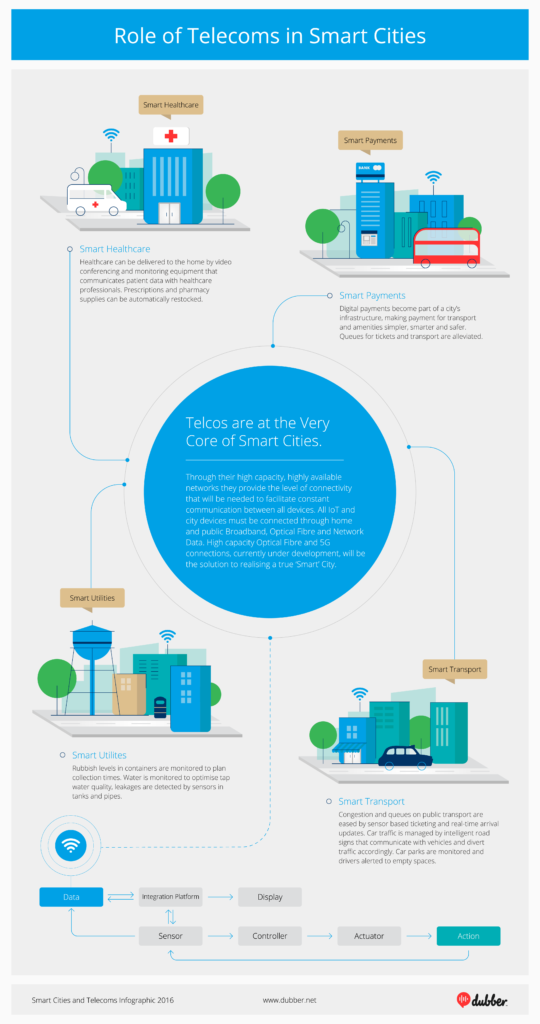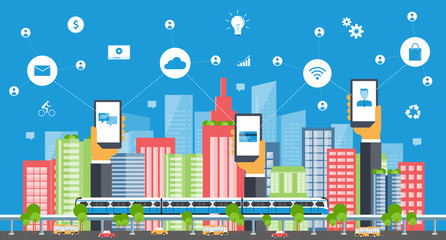Current figures are at 54%, and this is set to rise to 66% by 2050. The megacities of the world currently hold more than 10 million inhabitants, and this is due to increase further.
With the populations of urban areas rising worldwide, managing the increased strain on resources is one of the major challenges that the world is facing in the present day.
To address this challenge, recent focus has turned to evolving cities to become more efficient in order to keep up with their surging populations.
These newly developed cities are known as smart cities. Singapore, with 100% of its population living in urban areas, is understandably leading the way in the development of smart cities around the world.
Global tech leaders are looking to Singapore to lead the way, as cities worldwide search for the best ways to build cities that smartly manage the needs of millions of inhabitants.
Big data and the Internet of Things are thought by many to be the solution to building smart cities.
>See also: The smart nation: Singapore’s masterplan
However, the amounts of data that the IoT will need to process to run a smart city will be enormous, and so an efficient network that can handle this data volume is essential.
The implementation of 5G will likely provide this network, therefore enabling the IoT to become a possibility on a larger scale.
Once 5G and the IoT are running, the technology will be able to assist the setup and smooth running of smart cities.
To support smart cities and the necessary 5G and IoT, strong connectivity will be absolutely essential.
Without connectivity, processing the sheer volumes of data that smart cities will need to create a network of communicating devices will be impossible.
This is the ‘in’ that telcos need to become involved in this next generation of technology and communications.
Every device that is part of a smart city must work with others to manage the resources of megacity populations. These devices must therefore communicate with each other if the city is to be truly ‘smart’.
Without technology that supports this level of connectivity, smart cities will struggle to succeed. Connectivity is at the very core of service provider’s businesses.
With their ability to provide connectivity, their substantial experience in managing complex and busy networks, and their knowledge in dealing with cyber security issues, telcos are in a prime position to profit from smart cities.
However, to keep up with the substantial requirements that smart cities will present, they must invest time and money developing both their networks and management systems.
>See also: The future of smart power in the smart city
A major problem with the current development of smart cities is that, all too often, technology is being used to solve problems that don’t already exist or are not priority – such as smart parking.
A true smart city should use technology to solve pre-existing problems, such as environmental impact, or the strain of growing populations on transport and resources.
A list of 10 key steps in building a smart city by The Guardian is in agreement with this view, and suggests we must first ‘work out what problems need fixing.’
They suggest that too many smart city visions concentrate on big data and the Internet of Things when there are more fundamental problems – such as how to effectively implement these systems.
The message here is not that big data and the IoT are irrelevant to the cause, but that without the more basic technology solutions that first ensure their success (such as connectivity and 5G), smart cities cannot be bought to fruition.
The logistical, financial and management sides of smart cities presently lack planning.
The Guardian suggests effective smart cities are built from the bottom up, and they cite Fujisawa in Japan as an example of this.
To match the success of Fujisawa, the logistical solutions that enable the innovative developments in technology must be considered and once more, connectivity is at the centre of this.
Communications and networking must not be overlooked by smart cities if they are to succeed; telco involvement could see the development of ‘heterogeneous networks’ that can deliver service to and share data with the multiple platforms that smart cities will need.
>See also: The smart credit card designed for preventing fraud
If telcos were to provide smart technology offerings that enable the development of smart cities, this would provide the gateway for others to build true smart cities.
Telcos are currently investing in improving their capacity, speeds and latency to match the expectations of 5G – and these same developments will assist in answering the demand that smart cities will place on networks.
The immediate priority then, is to gear up for 5G by investing in and developing networks that are capable of hosting its speed and latency, and that are capable of managing the IoT solutions that will follow its release.
Other priorities are to involve these technologies in the development of smart cities, and in so doing, place their communication services at their very core.
Finally, they must adapt their infrastructure and develop ‘heterogeneous networks’, as the current siloed networks will not support smart cities.
If telcos succeed in adapting, investing and developing their technology solutions to meet the innovation of 5G, the IoT and ultimately smart cities, they will be in the position of power to benefit from the resulting revenue streams.
They will also be able to leverage big data and various cloud computing solutions to offer value added solutions, which will generate yet more profit opportunities.








